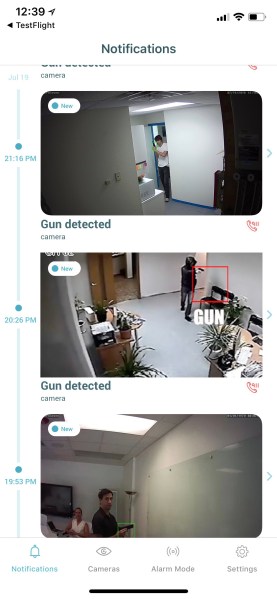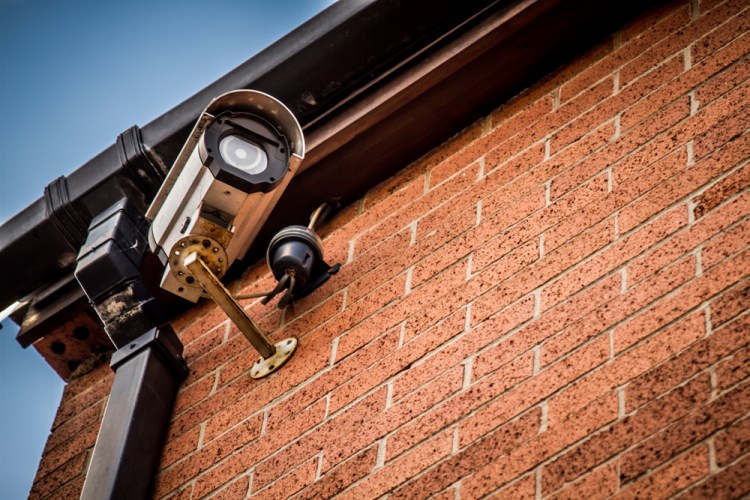Watch all the Transform 2020 sessions on-demand here.
In the first 21 weeks of 2018 alone, there were more than 23 school shootings that resulted in death or injury in the U.S. Gun violence across the country might be on the decline, but when it does occur, the results are often tragic. That’s one of the reasons 34 percent of parents fear for their child’s physical safety at school, a recent poll found — almost triple the number of parents from 2013.
Lisa Falzone and Chris Ciabarra think artificial intelligence (AI) could play a key role in preventing mass shootings. The serial entrepreneurs cofounded Athena Security, a startup that’s developing a machine learning layer for security cameras in retailers, corporations, and schools.
It’s their first venture after Revel Systems, an iPad point-of-sale company they sold in 2017.
“These school shootings left us really disturbed. It’s a lot of death that shouldn’t happen with modern technology,” Falzone told VentureBeat in a phone interview. “Chris and I asked ourselves, if we could help save students’ lives we had to pour our heart and soul into [this] … It was around the time of the Las Vegas shooting when we realized that we could parlay our cloud … expertise with Revel to create an AI-powered system.”
June 5th: The AI Audit in NYC
Join us next week in NYC to engage with top executive leaders, delving into strategies for auditing AI models to ensure fairness, optimal performance, and ethical compliance across diverse organizations. Secure your attendance for this exclusive invite-only event.

Above: A screenshot of the Athena security app.
Their solution employs a Nvidia 2080 RTX graphics card and computer vision to detect what Falzone calls “dangerous objects” — specifically guns. (Future versions will spot knives, too.) The AI system ingests footage from off-the-shelf security cameras and looks for “dangerous motion” at a rate of 30 frames per second, alerting school administrators (or the police) via an app when a threat’s detected.
It’s not unlike Amazon’s Rekognition or IBM’s Watson Visual Recognition service in that respect, but Falzone claims the algorithms are more precise in anticipating threats than broad-spectrum APIs would be. It’s also cheaper in some cases: Athena employs a hybrid processing model that performs the bulk of inference on-premises, which gives it the added advantage of being able to interface with third-party systems to lock doors, halt elevators, and communicate with people on site.
No system’s perfect, of course, so I asked Falzone what happens if there’s a false alarm. She explained that notifications dispatched by the system have a “true or false” selector that makes it easy to flag mistakes, and that every flag feeds back into the system and improves its accuracy.
Falzone and Ciabarra also noted that it doesn’t perform facial recognition of any kind and that all data’s deleted immediately after analysis. That privacy-first approach won Athena its first customer — Archbishop Wood High School in Warminster, Pennsylvania — which partnered with the startup last week to pilot the system.
“In addition to providing an excellent education, we have a duty and responsibility to keep our students safe,” said Gary Zimmaro, the school’s president. “With 246 mass shootings in 2018 alone, Athena Security has calmed parents’ fears substantially here at Archbishop Wood High School.”
Athena Security operates on a subscription model. Three versions of the product launch today: a $100-a-month Unlimited tier with all AI capabilities, a $50-a-month Enterprise version with fewer features, and a $20-a-month Pro plan with people detection. (Pricing is per camera.)
Athena Security is not the only company applying AI to school security. This week marked the launch of Deep North’s platform, which similarly taps computer vision to detect threats and interpret people’s movements. Earlier this year, a high school in eastern China began testing an “intelligent classroom behavior management system” that uses facial recognition designed to analyze students’ engagement in real time. And a Paris business school is using artificial intelligence and facial analysis supplied by LCA Learning’s Nestor to determine whether students are paying attention in class.
Companies like Shielded Students, meanwhile, hope to employ cameras, integrated microwave radar scanners, and computer vision software to identify guns and other hidden weapons in schools.


